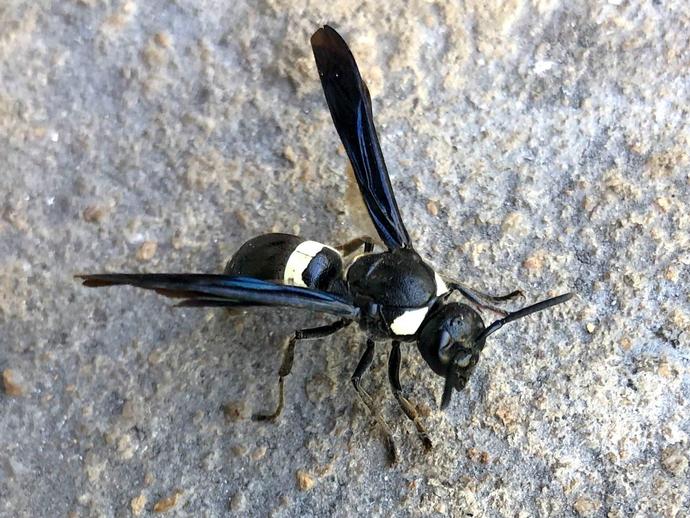July 27, 2020
At first glance, you might think this is the dreaded bald-faced hornet (Dolichovespula maculata), a type of wasp known for being highly aggressive. As someone who once tried to knock down a bald-faced hornet nest that was not as abandoned as it appeared and then broke into a sprint that would have impressed Usain Bolt, I can attest to the terror of the bald-faced hornet.
However, this is actually Monobia quadridens, also known as the four-toothed mason wasp, and it's a great ally to have around your home! The easiest way to tell the difference is that bald-faced hornets have white on their faces/heads (hence the name), while four-toothed mason wasps do not.
Another big difference is that bald-faced hornets are social, living in large hives, while these mason wasps are solitary. Mason wasps seek out pre-made holes, such as holes dug out by wood-boring beetles, hollow plant stems, or in the case of this fellow on my back porch, abandoned carpenter bee galleries. After laying a single egg, the female wasp will go out hunting for small caterpillars; her sting paralyzes caterpillars (though doesn't kill them) and she brings them back to the hole, where they will serve as snacks for her wasp larva.
Mason wasps are also important pollinators, and when combined with their propensity for taking out potentially destructive caterpillars, they're a great friend to have in your garden! While they are capable of stinging, they're not inclined to unless they feel threatened. I have a bunch living in old carpenter bee galleries on my back porch and I've never been stung. #BenInNature
ABOUT THIS POST
Social distancing can be difficult, but it presents a great opportunity to become reacquainted with nature. While he is working from home, Administrator of Science Ben Williams is venturing outdoors each day to record a snapshot of the unique sights that can be found in the natural world.
NATURE PHOTO IDENTIFICATIONS
If you discover something in nature that you would like help identifying, be sure to message us right here on Facebook with a picture (please include location and date of picture) and we'll have our experts help you identify it!

 Hours & Admissions
Hours & Admissions Directions
Directions

